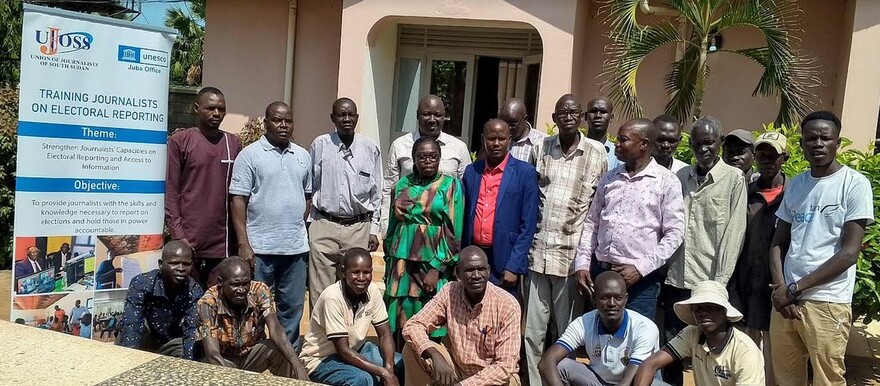At least 28 journalists on Wednesday concluded a two-day training in elections reporting in the Eastern Equatoria State capital Torit.
The training organized by the Union of Journalists of South Sudan (UJoSS) with support from the United Nations Educational, Scientific and Cultural Organization (UNESCO) aimed at strengthening the journalist’s capacities in electoral reporting and access to information.
Oyet Patrick, the Chairperson of the UJoSS, said the training is to prepare journalists to accurately report and update citizens on election processes.
He urged participants to collaborate, and work hard and assured them of UJoSS’ commitment to lobby for funds to equip and boost their capacities across the country.
“As journalists, our work requires information all the time, so we need to always collaborate and work together so that we provide information that is accurate and authentic to our people when reporting on elections,” Oet said. “We believe this is very important so that we report well because an election is not an event, it is not the actual day of voting that we should be reporting, but even pre-election activities. We have the election itself and then the post-election when elections are already done and results are already announced which we also need to report.”
“We are here for two days with the support of UNESCO and we are asking for more support so that we come back,” he added.
On her part, Dorrin Lopoka, the UNESCO communication and information specialist, said that to realize free, fair, and credible elections, citizens are encouraged to access information and express themselves freely. She urged the government to promote freedom of speech and allow people to participate fully in election processes without intimidation or restrictions.
“As we prepare for elections in December, I want to emphasize that access to information and freedom of information are very important elements for us to achieve elections that are free, fair, and credible but also the important element for us to achieve democracy,” she said. “When there is access to information and freedom of expression, people will be free to participate in government and hold government accountable.”
Lopoka added: “So, I want to encourage you Journalists to put out as much information as you can about elections.”
Meanwhile, Opiny James, the Chairperson of the Eastern Equatoria State Union of Journalists, applauded UJOSS and UNESCO for initiating the training which he said was timely.
He said journalists in Eastern Equatoria are committed to supporting, informing, and updating citizens about the upcoming elections.
“I am very happy for our team from Juba who organized this important training to guide journalists on how to report on elections,” he stated. “I appreciate the initiatives by UJoSS to always train journalists in Eastern Equatoria and most journalists are now improving their skills in reporting and practicing ethics of journalism.”
Eastern Equatoria State Information Minister Elia John Ahaji said besides funding, local journalists lack gadgets to do their work.
He however expressed the government’s readiness to support media institutions in ensuring the right information reaches the grassroots.
“I would like to thank UNESCO for standing with UJoSS by giving financial support to make sure they actualize their dreams. Our journalists wish to do more but they have a lot of challenges in terms of financial constraints and tools for work,” he said. “The Government of Eastern Equatoria State is ready for elections and we are also very happy that the journalists are well prepared with the support from UJoSS.”
“When we are all prepared, I think the citizens of South Sudan will also be prepared,” Minister Ahaji concluded.




